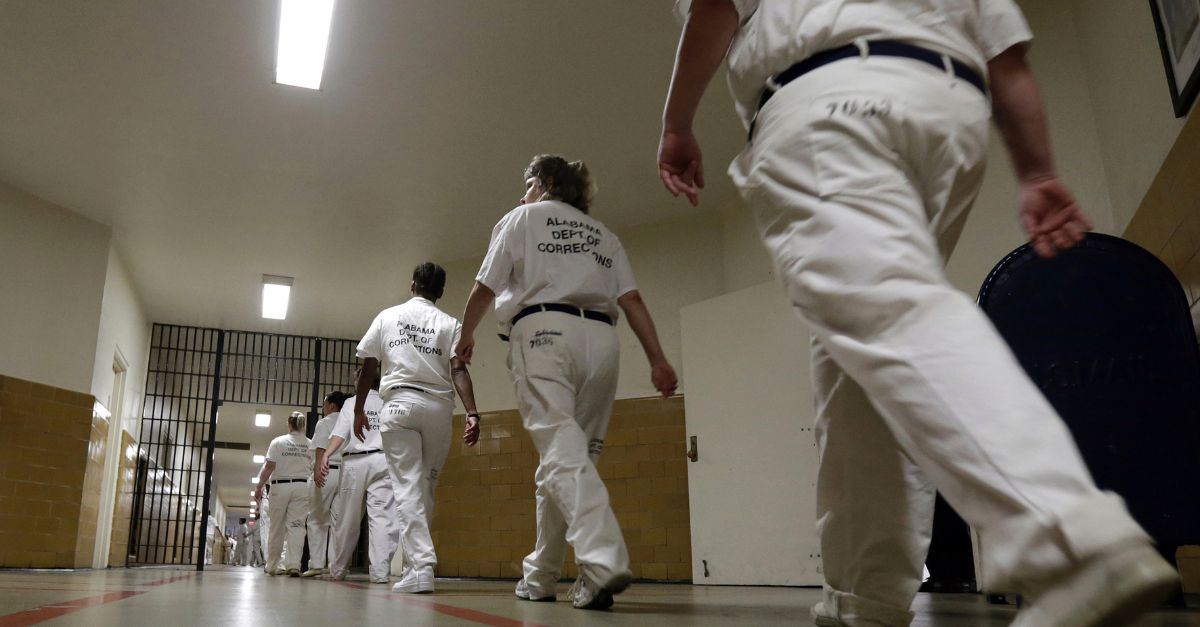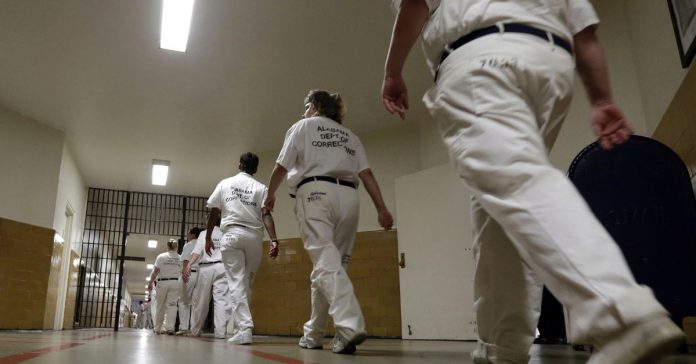
Inmates walk the halls in formation at Tutwiler Prison for Women, Sept. 23, 2013, in Wetumpka, Ala. On Tuesday, Dec. 12, 2023, current and former inmates announced a lawsuit challenging Alabama’s prison labor program as a type of “modern-day form of slavery,” saying prisoners are forced to work for little pay — and sometimes no pay — in jobs that benefit government entities or private companies. (AP Photo/Dave Martin, File)
A group of current and former Alabama prisoners filed a federal lawsuit Tuesday saying that they were forced into “a modern-day form of slavery” by working at fast-food chains for next to nothing.
The complaint, which seeks class-action certification, alleged that the prisoners “have been entrapped in a system of ‘convict leasing’ in which incarcerated people are forced to work, often for little or no money,” all while Alabama and its corporate partners reap millions in profits.
Inmates, according to the complaint, “live in a constant danger of being murdered, stabbed, or raped that is so profound that the federal government has sued Alabama for inflicting cruel and unusual punishment, and if they refuse to work, the State punishes them even more.”
The plaintiffs said they are regularly forced to work at McDonald’s, KFC, Wendy’s, and Burger King franchises, Anheuser-Busch distributors, and meat processors.
The 129-page complaint alleges it is “no accident” that the people “caught in a labor-trafficking scheme” are Black, comparing it to “like individuals who were enslaved and forced to work Alabama’s cotton fields, and those forced to participate in the sharecropping and convict leasing schemes that followed the end of the Civil War.”
The complaint noted that while 26.8% of Alabama’s population identifies as Black or African American, double that percentage comprises the Black incarcerated population.
The plaintiffs’ lawsuit, filed in the U.S. District Court for the Middle District of Alabama, accused over two dozen state officials including Gov. Kay Ivey and Attorney General Steve Marshall, along with numerous government agencies and private employers, including the Alabama Department of Corrections (ADOC), of violating the Trafficking Victims Protection Act.
Plaintiff Robert Earl Council, also known as Kinetik Justice, is an incarcerated activist who cofounded the Free Alabama Movement, a group that helped organize a 2016 nationwide strike among incarcerated people.
In a video statement shared with Law&Crime Wednesday by the plaintiffs’ legal team, Council characterized Alabama’s work programs as an extension of pre-Civil War slavery. Council said:
Alabama seems to be addicted to cheap labor. Those who participate and those who partake in the slave process with Alabama are just as guilty as they are. Each corporation, each fast food company — anybody who participates and has their hand in in their cookie jar with the Alabama Department of Corrections — you’re guilty of slavery. You are a slave master. So there’s no need to be about what you would have done had you been back in that era. Because we’re living in that era right now.
In their complaint, plaintiffs alleged that Alabama generates an annual $450 million from forced labor. The inmates work against their will and the ADOC takes 40% of gross earnings “purportedly ‘to assist in defraying the cost of his/her incarceration,”” asserted the complaint. Plaintiffs noted that the amount is “shocking” given that ADOC’s facilities were recently found by the Department of Justice to be significantly deficient.
Indeed, in 2020, the DOJ sued Alabama and said its prisons were “riddled with prisoner-on-prisoner and guard-on-prisoner violence.”
The complaint detailed the stories of the individual plaintiff prisoners as well. One individual, Lakiera Walker, was incarcerated from 2007 to 2023. Walker said that for years, she was forced to perform long hours of uncompensated work that included housekeeping, stripping floors, providing care for mentally disabled or other ill incarcerated people, unloading chemical trucks, working inside freezers, and at Burger King. She said she was paid just $2 per day and was subjected to sexual harassment by a supervising officer.
Walker said that she was forced to work even when ill and that an ADOC job placement officer told her she must “get up and go make us our 40%.”
In the video statement, Walker described the conditions under which she has been forced to work and said that many women currently incarcerated are afraid to speak out for fear of retaliation.
“Those women need help,” Walker said. “They really need a voice. I knew I had to do something. I want justice for this forced labor.”
The complaint alleged that in addition to subjecting inmates to harsh conditions and an ever-looming threat of solitary confinement, the work programs created an irreconcilable reality: incarcerated individuals were routinely denied parole on grounds that confinement was necessary for public safety while those same individuals worked regularly at fast-food restaurants and other local businesses without supervision.
Plaintiffs argued that Alabama’s practices are illegal under both the Alabama and U.S. Constitutions and asked that the court award compensatory and punitive damages including disgorgement of Alabama’s profits with interest.
Representatives from the State of Alabama did not respond to requests for comment.
You can read the full complaint here.
Have a tip we should know? [email protected]

